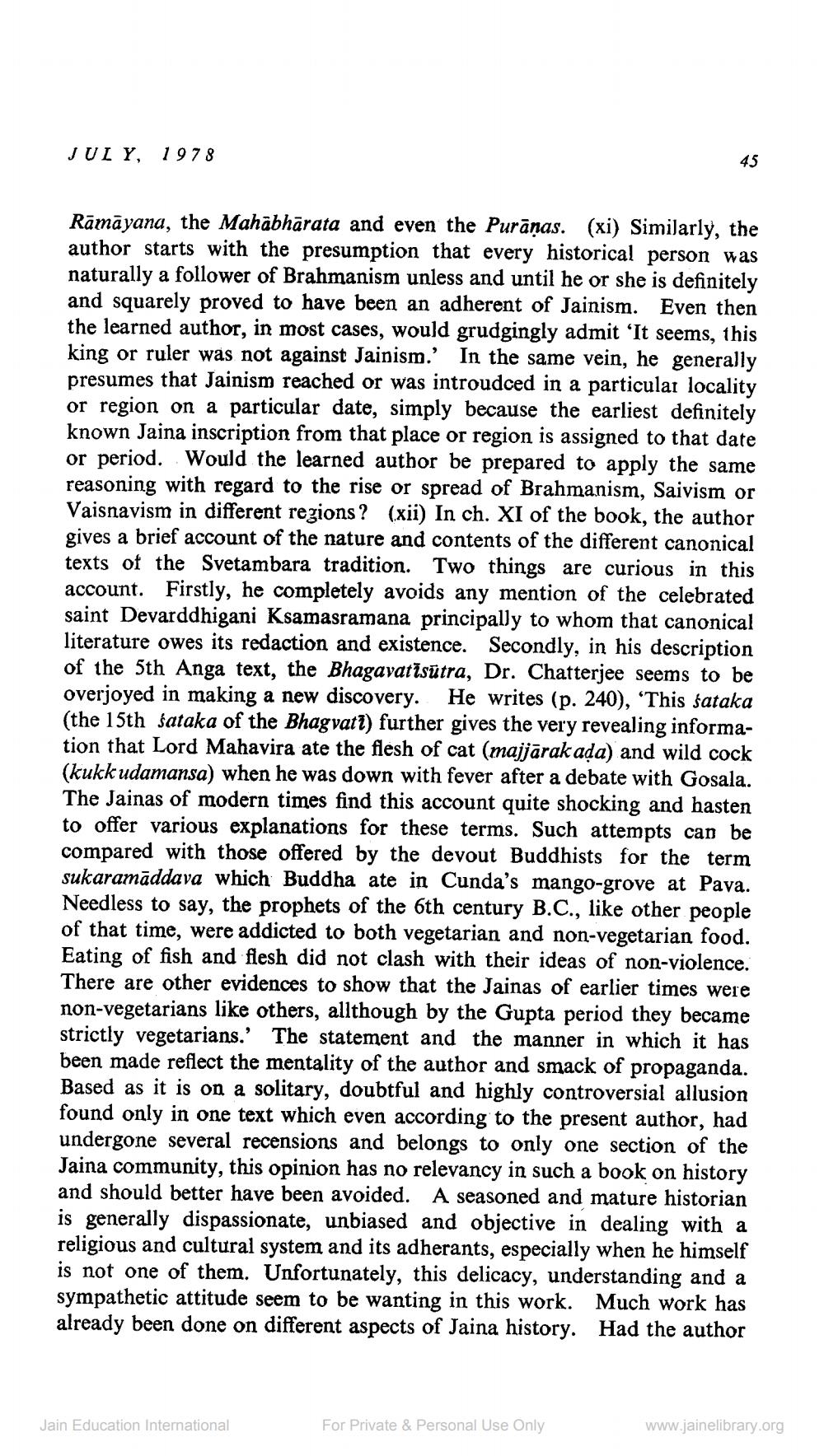Book Title: Jain Journal 1978 07 Author(s): Jain Bhawan Publication Publisher: Jain Bhawan Publication View full book textPage 5
________________ JULY, 1978 Rāmāyana, the Mahābhārata and even the Purānas. (xi) Similarly, the author starts with the presumption that every historical person was naturally a follower of Brahmanism unless and until he or she is definitely and squarely proved to have been an adherent of Jainism. Even then the learned author, in most cases, would grudgingly admit 'It seems, this king or ruler was not against Jainism. In the same vein, he generally presumes that Jainism reached or was introudced in a particular locality or region on a particular date, simply because the earliest definitely known Jaina inscription from that place or region is assigned to that date or period. Would the learned author be prepared to apply the same reasoning with regard to the rise or spread of Brahmanism, Saivism or Vaisnavism in different regions ? (xii) In ch. XI of the book, the author gives a brief account of the nature and contents of the different canonical texts of the Svetambara tradition. Two things are curious in this account. Firstly, he completely avoids any mention of the celebrated saint Devarddhigani Ksamasramana principally to whom that canonical literature owes its redaction and existence. Secondly, in his description of the 5th Anga text, the Bhagavatīsūtra, Dr. Chatterjee seems to be overjoyed in making a new discovery. He writes (p. 240), 'This śataka (the 15th śataka of the Bhagvati) further gives the very revealing information that Lord Mahavira ate the flesh of cat (majjārakada) and wild cock (kukk udamansa) when he was down with fever after a debate with Gosala. The Jainas of modern times find this account quite shocking and hasten to offer various explanations for these terms. Such attempts can be compared with those offered by the devout Buddhists for the term sukaramāddava which Buddha ate in Cunda's mango-grove at Pava. Needless to say, the prophets of the 6th century B.C., like other people of that time, were addicted to both vegetarian and non-vegetarian food. Eating of fish and flesh did not clash with their ideas of non-violence. There are other evidences to show that the Jainas of earlier times were non-vegetarians like others, allthough by the Gupta period they became strictly vegetarians.' The statement and the manner in which it has been made reflect the mentality of the author and smack of propaganda. Based as it is on a solitary, doubtful and highly controversial allusion found only in one text which even according to the present author, had undergone several recensions and belongs to only one section of the Jaina community, this opinion has no relevancy in such a book on history and should better have been avoided. A seasoned and mature historian is generally dispassionate, unbiased and objective in dealing with a religious and cultural system and its adherants, especially when he himself is not one of them. Unfortunately, this delicacy, understanding and a sympathetic attitude seem to be wanting in this work. Much work has already been done on different aspects of Jaina history. Had the author Jain Education International For Private & Personal Use Only www.jainelibrary.orgPage Navigation
1 ... 3 4 5 6 7 8 9 10 11 12 13 14 15 16 17 18 19 20 21 22 23 24 25 26 27 28 29 30 31 32 33 34 35 36 37 38 39 40 41 42 43 44 45 46 47 48 49 50 51 52
